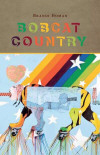Bobcat Country
The poems in Bobcat Country sling readers into a humorous yet serious exposition of American culture that mocks relationships between American capitalism and pop culture, the American family, and the “business” of contemporary poetry.
The poems in Bobcat Country sling readers into a humorous yet serious exposition of American culture that mocks relationships between American capitalism and pop culture, the American family, and the “business” of contemporary poetry.
The book’s opening poem “What It Means to Be an American” sets the stage: “It’s a picnic. Buckets of beer, a bluegrass band, a shotgun / wedding.” Such precise, familiar details are characteristic of the style of this book. The details spark throughout; we see “the Tupperware deviled egg carrier”; “Max Headroom”; “moon boots”; “Coed Naked t-shirts”; and “an old Easter basket full of headbands and drying nail polish,” and we hear Skid Row and The Hold Steady on the radio. They are all nearly tangible and absolutely captivating.
This precision makes it nearly impossible not to identify on some level with the speakers in these poems; their voices exhibit the twenty-first-century family milieu anywhere in the world. The families presented are also players in Homan’s portrayal of an America we all can recognize, at times with admiration, at other times with aversion:
A Simpson sister tries to sing. Half of us are pregnant.
The other half are sterile. This is not a dystopia, so obviously
dystopic – our knives keep getting bigger.
None of us can stop eating.
Admittedly, part of the reason I am enamored with this book is that it confers significant attention to Midwestern life in the 1980s, which is when and where I was raised. Of course it’s not necessary to have grown up in the Midwest in the 80s in order to appreciate these poems. The poems are much deeper, much more representative of interpersonal relationships, the items we own, and how those items affect our identities (past, present and future).
Bobcat Country relates to its readers because we each have some kind of relationship with America, because we each have once been a teenager, and because we each are lovers (many of us writers) of poetry. But, don’t forget, as Homan’s poem “For Poets (& Others)” tells us, if you are a poet “do not admit to being a poet unless asked directly. It’s like saying your grandmother died. Maybe you weren’t close with your grandmother? People don’t know what to do.”





